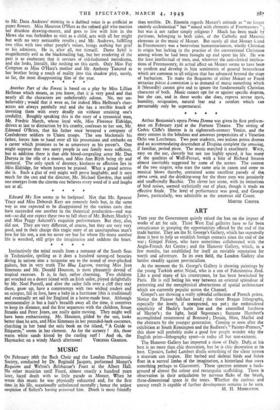MUSIC
ON February 26th the Bach Choir and the London Philharmonic Society, conducted by Dr. Reginald Jacques, performed Mozart's Requiem and Walton's Belshazzar's Feast at the Albert Hall. No other musician until Faure, almost exactly a hundred years later, faced death with so little parade as Mozart. When he wrote this music he was physically exhausted and, for the first time in his life, occasionally unbalanced mentally ; hence the unjust suspicion of Salieri's having poisoned him. Death is more friendly than terrible. Dr. Einstein regards Mozart's attitude as " no longer entirely ecclesiastical " but " mixed with elements of Freemasonry " ; but was it not rather simply religious ? Much has been made by partisans, belonging to both sides, of the Catholic and Masonic elements in the music of Mozart. But surely all that Mozart Lund in Freemasonry was a benevolent humanitarianism, wholly Christian in origin but lacking in the practice of the conventional Christians among whom he had been brought up and spent his life. He was the least intellectual of men, and, whatever the anti-clerical implica- tions of Freemasonry, its actual affect on Mozart seems to have been to confirm and develop in him sentiments of general benevolence which are common to all religion that has advanced beyond the stage of barbarism. To make the Requiems of either Mozart or Faure sectarian pieces a conviction is to demand of music something which it (blessedly) cannot give and to ignore the fundamentally Christian character of both. Music cannot opt for or against specific dogmas, but she can, and in these works she does, express serene trust, humility, resignation, natural fear and a comfort which can presumably only be supernatural.
Arthur Benjamin's opera Prima Donna was given its first perform- ance on February 23rd at the Fortune Theatre. The setting of Cedric Cliffe's libretto is in eighteenth-century Venice, and the story centres in the bibulous and amorous propensities of a Venetian Ochs von Lerchenau. Two poor students, two jealous prima donnas and an accommodating descendant of Despina complete the amusing, if familiar, period piece. The music matched it excellently. Witty, easy on the ear, cleverly but not too highly spiced, it has many of the qualities of Wolf-Ferrari, with a hint of Richard Strauss almost inevitably suggested by some of the scenes. The contest of the two singers, who start the same aria in canon and come to musical blows thereby, contained some excellent parody of the opera seria, and the drinking-song for the three men was genuinely and unaffectedly Bacchic. The clever last scene, with its imitations of bird noises, seemed stylistically out of place, though it made an effective finale. The level of performance was good, and George James, particularly, was admirable as the amorous old Count.
MARTIN COOPER.






































 Previous page
Previous page